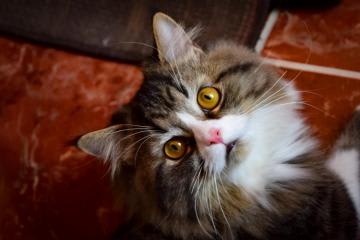
When pets have “toilet” accidents, many families assume the problem is behavioral. However, when a dog that was previously house-trained starts to urinate inside the house or a cat starts to urinate outside the litter box, the first thing that should be done is to schedule a visit with their veterinarian. Very often the pet is trying to tell them there may be a physical problem or illness that is causing a change in elimination habits.
By Dr. Kasandra Garner
Frequent urination with small amounts produced can be a sign of a urinary tract infection. In dogs this may mean asking to go out more often than usual or squatting without producing a stream. Cats with urinary tract infections make multiple visits to the litter box, and may vocalize while voiding. Female cats and dogs that are showing these signs are more likely to have bladder infections, while male cats more commonly suffer from sterile cystitis. Male dogs can have bladder infections, although they're rare compared to females; they can also have prostate disease or bladder stones. Bladder stones can be seen in dogs or cats, male or female. Because their urethras are longer and narrower than females' urethras, male cats and dogs that form bladder stones are at risk of urinary blockage when small stones or crystals formed in the bladder lodge in the urethra. This can be life threatening. If your male dog or cat is straining frequently or for long periods of time and you do not see any urine coming out, please call our office to be seen as soon as possible. Early intervention for urinary obstruction can save lives!
Pets who are urinating larger amounts at a time than usual, or having large volume of urine in their "accidents" may have a systemic disease such as kidney disease, diabetes mellitus or hyperadrenocorticism. Pets with these diseases also drink excessive amounts of water. Urinalysis and blood tests are needed to diagnose these diseases.
Some pets may develop a type of incontinence where they leak urine, especially while relaxed or asleep. The most common causes of incontinence are a weak bladder sphincter (the muscles that help keep urine in the bladder), spinal cord disease, or a urinary tract infection.
Regardless of the type of urinary signs your pet is exhibiting, the first step is to have a urinalysis performed by your veterinarian. Depending on the results, the doctor may advise also performing bloodwork or x-rays. Most causes of inappropriate urination can be cured or managed with inexpensive medication. Don’t assume your pet has a behavioral issue until other causes of house-training woes have been ruled out.

